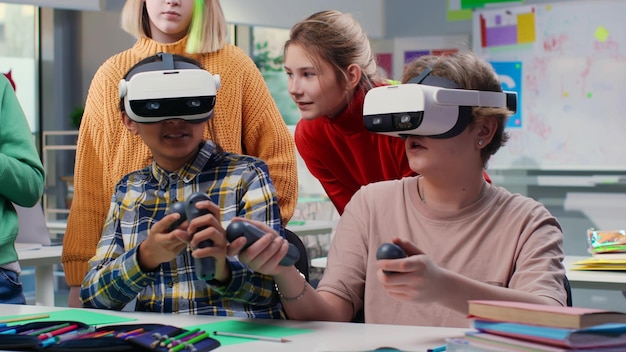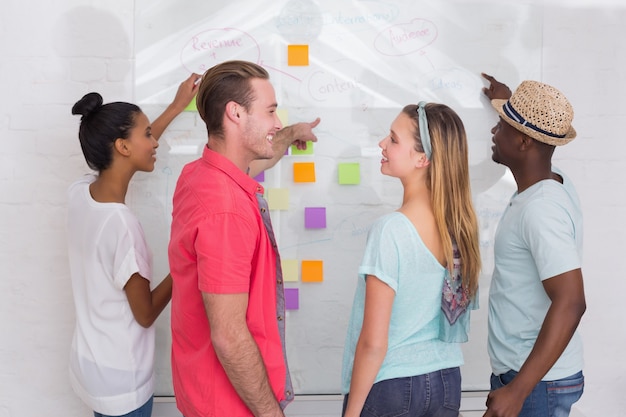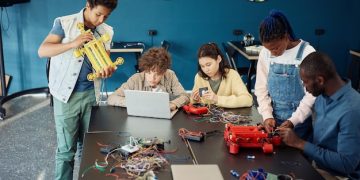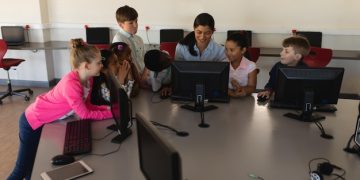Future of Education: Top 5 Skills for Students by 2030

Experts predict that by 2030, the most critical skills for students will include adaptability, complex problem-solving, creativity, technological literacy, and strong interpersonal communication, enabling them to thrive in a rapidly evolving global landscape.
Get ready for 2030! Experts are weighing in on the skills students need to succeed, and it’s more than just textbook knowledge. What are the top 5?
The Future of Education: Preparing Students for 2030
The educational landscape is constantly evolving, and anticipating future needs is crucial for student success. The Future of Education: Experts Predict the Top 5 Skills Students Will Need by 2030, is about more than just academics; it’s about equipping young people with the tools they need to thrive in a dynamic and complex world.
As we approach 2030, it’s clear that the skills demanded by employers and society will be significantly different from those of today. This article explores the key competencies that educators and students should prioritize to ensure future readiness.
Adaptability and Lifelong Learning
Adaptability is the ability to adjust to new conditions. In a rapidly changing world, this skill is becoming increasingly important.
The pace of technological advancement and globalization requires individuals to be flexible and open to learning new things throughout their lives. Education must foster a growth mindset, encouraging students to embrace challenges and view failure as an opportunity for growth.

Why Adaptability Matters
Adaptability isn’t just about surviving change; it’s about thriving in it. Those who can quickly learn and adjust to new situations will be best positioned to succeed in the future job market.
- Embrace Change: Encourage students to view change as an opportunity rather than a threat.
- Develop Resilience: Teach students how to bounce back from setbacks and learn from their mistakes.
- Foster Curiosity: Cultivate a lifelong love of learning and exploration.
Educational institutions need to create environments that promote adaptability by incorporating flexible curricula, project-based learning, and real-world problem-solving. These experiences help students develop the critical thinking and problem-solving skills necessary to navigate uncertainty.
Complex Problem-Solving
Complex problem-solving involves the ability to analyze multifaceted issues and develop effective solutions.
This skill goes beyond rote memorization and requires students to think critically, creatively, and strategically. In a world filled with intricate challenges, such as climate change, healthcare reform, and economic inequality, the ability to solve complex problems is essential.
How to Develop Problem-Solving Skills
Effective problem-solvers are able to break down complex issues into smaller, more manageable components. They can identify patterns, analyze data, and evaluate different solutions.
- Critical Thinking: Encourage students to question assumptions and evaluate evidence.
- Analytical Skills: Teach students how to break down complex problems into smaller, more manageable parts.
- Creative Solutions: Foster innovative thinking and the ability to come up with unique solutions.
Schools can foster complex problem-solving skills by incorporating case studies, simulations, and collaborative projects into the curriculum. These activities provide students with opportunities to grapple with real-world challenges and develop their problem-solving abilities.
Creativity and Innovation
Creativity is the ability to generate new ideas and approaches. Innovation involves implementing those ideas to create value.
In an increasingly competitive global economy, creativity and innovation are essential for driving progress and economic growth. Students need to be able to think outside the box, challenge conventional wisdom, and develop novel solutions to pressing problems.
The Importance of Creative Thinking
Creative thinking allows students to approach problems from new angles and develop innovative solutions that may not be immediately apparent.
- Encourage Experimentation: Provide students with opportunities to explore new ideas and approaches without fear of failure.
- Promote Collaboration: Foster teamwork and the sharing of ideas to spark innovation.
- Value Diverse Perspectives: Embrace different viewpoints and encourage students to challenge assumptions.
To cultivate creativity and innovation, educators should encourage students to explore their passions, experiment with different mediums, and take risks. Project-based learning, design thinking, and arts integration can all help students develop their creative potential.

Technological Literacy
Technological literacy is the ability to use, manage, and understand technology effectively.
As technology continues to permeate every aspect of our lives, it’s crucial for students to develop a strong understanding of both the capabilities and limitations of various technologies. This includes not only knowing how to use specific tools and platforms but also understanding the underlying principles and concepts.
Building Technological Competence
Technological competence includes not only the practical skills needed to use technology but also the critical thinking skills needed to evaluate and apply it effectively.
- Coding and Programming Skills: Teach students the basics of coding and programming to help them understand how technology works.
- Data Analysis: Develop students’ ability to interpret and analyze data to make informed decisions.
- Digital Citizenship: Promote responsible and ethical use of technology.
Schools should integrate technology into the curriculum in meaningful ways, providing students with opportunities to use technology to solve problems, collaborate with others, and create new products. This will help students develop the technological literacy they need to succeed in the digital age.
Interpersonal Communication Skills
Interpersonal communication skills involve the ability to communicate effectively with others.
In an increasingly interconnected world, effective communication is essential for building relationships, collaborating with others, and navigating complex social situations. Students need to be able to communicate clearly, respectfully, and persuasively, both verbally and in writing.
Mastering Communication
Mastering communication means being able to effectively convey your ideas, listen attentively to others, and resolve conflicts constructively.
- Active Listening: Encourage students to listen attentively and empathetically to others.
- Verbal and Nonverbal Communication: Teach students how to communicate clearly and effectively, both verbally and nonverbally.
- Conflict Resolution: Develop students’ ability to resolve conflicts peacefully and constructively.
Schools can foster interpersonal communication skills by incorporating group projects, debates, and role-playing activities into the curriculum. These experiences provide students with opportunities to practice their communication skills in a safe and supportive environment.
Ethical and Moral Reasoning
Ethical and moral reasoning involves the ability to make sound judgments based on ethical principles.
As technology advances and society becomes more complex, it’s increasingly important for individuals to have a strong moral compass. Students need to be able to evaluate ethical dilemmas, consider different perspectives, and make decisions that align with their values.
Developing Ethical Awareness
Developing ethical awareness involves not only understanding ethical principles but also being able to apply them in real-world situations.
- Moral Dilemmas: Present students with ethical dilemmas and encourage them to discuss different perspectives.
- Case Studies: Use case studies to explore ethical issues in various contexts.
- Values Clarification: Help students identify and clarify their own values.
Schools can promote ethical and moral reasoning by incorporating discussions of ethics into the curriculum, providing opportunities for students to engage in community service, and modeling ethical behavior.
| Key Skill | Brief Description |
|---|---|
| 🧠 Adaptability | The ability to adjust to new conditions and learn quickly. |
| 🧩 Problem-Solving | Analyzing complex issues and developing effective solutions. |
| 🎨 Creativity | Generating new ideas and innovative approaches. |
| 💻 Tech Literacy | Effectively using and understanding various technologies. |
Frequently Asked Questions
▼
Adaptability is considered crucial. With rapid changes in technology and society, the ability to adjust and learn continuously will be vital for success.
▼
Schools can promote creativity by encouraging experimentation, collaboration, and valuing diverse perspectives. Project-based learning and arts integration are also effective methods.
▼
Technological literacy enables students to navigate and utilize technology effectively. This includes coding, data analysis, and understanding the ethical implications of technology.
▼
Effective communication is essential for building relationships, collaborating, and resolving conflicts. Schools can foster these skills through group projects and debates.
▼
Ethical reasoning can be taught through discussions of moral dilemmas, case studies and opportunities for students to clarify their own values and ethical principles.
Conclusion
Preparing students for the future requires a shift in focus towards skills that go beyond traditional academic knowledge. By prioritizing adaptability, problem-solving, creativity, technological literacy, and interpersonal communication, educators can empower students to thrive in the ever-evolving world of 2030 and beyond.





